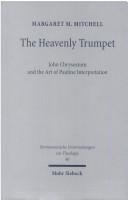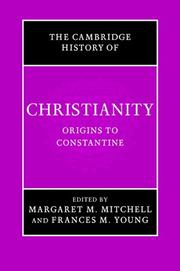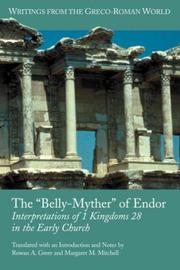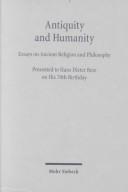| Listing 1 - 10 of 16 | << page >> |
Sort by
|

ISBN: 3161473604 9783161473609 Year: 2000 Volume: 40 Publisher: Tübingen Mohr Siebeck
Abstract | Keywords | Export | Availability | Bookmark
 Loading...
Loading...Choose an application
- Reference Manager
- EndNote
- RefWorks (Direct export to RefWorks)
John Chrysostom, --- Bible. --- Criticism, interpretation, etc. --- History --- Bible --- Criticism, interpretation, etc --- 276 =75 JOANNES CHRYSOSTOMUS --- 276:22 --- Griekse patrologie--JOANNES CHRYSOSTOMUS --- Patrologie en exegese --- John Chrysostom Saint --- 276:22 Patrologie en exegese --- History. --- Aranyszájú, János, --- Chrysostom, John, --- Chrysostomo, João, --- Chrysostomos, Iō. --- Chrysostomos, Johannes, --- Chrysostomus, Joannes, --- Crisostomo, Giovanni, --- Crisostomo, Juan, --- Crisostomus, Ioannes, --- Giovanni Boccadoro, --- Giovanni Crisostomo, --- Hōhan Oskiaban, --- Hovhan Oskeberan, --- Hovhannēs Oskeberan, --- Iō. --- Ioan Gură de Aur, --- Ioan Zlatoust, --- Ioann Zlatoust, --- Ioannes Crisostomus, --- Iōannēs ho Chrysostomos, --- Ivan Zolotoustyĭ, --- Jan Chryzostom, --- Ján Zlatoústy, --- Jean Bouche d'Or, --- Jean Chrysostome, --- Jehan Bouche d'Or, --- Joan Gojarti, --- Joannes Chrysostomus, --- Joannes Crisostomus, --- João Chrysostomo, --- Johannes Chrysostomus, --- Johannes Goldmund, --- John, --- Jovan Zlatoust, --- Juan Crisóstomo, --- Pseudo-Chrysostome, --- Pseudochrysostomus, --- Yoḥanes ʼAfa Warq, --- Yūḥannā al-Dhahabī al-Fam, --- Yūḥannā al-Fam al-Dhahabī, --- Yūḥannā Fam al-Dhahab, --- Zlatoust, Ioan, --- Zlatoust, Jovan, --- Zlatoústy, Ján, --- Ἰωάννης, --- Іван Золотоустий, --- يوحنا الذهبي الفم --- يوحنا فم الذهب، --- Epistles of Paul --- Paul, Epistles of --- Paul Sŏsin --- Pauline epistles --- Risālat al-Qiddīs Būlus al-rasūl al-thāniyah ilá Tīmūthīʼūs --- John Chrysostom, - Saint, - -407
Book
ISBN: 9783161546167 3161546164 Year: 2017 Volume: 393 1 Publisher: Tübingen Mohr Siebeck
Abstract | Keywords | Export | Availability | Bookmark
 Loading...
Loading...Choose an application
- Reference Manager
- EndNote
- RefWorks (Direct export to RefWorks)
"The apostle Paul was the inaugurator of early Christian literary culture, not only through the writing of his own letters (ca. 50-62 CE) - which were to become surprisingly influential once collected and published after his death - but also through the successful propagation of a religious logic of mediated epiphanies of Christ, on the one hand, and of "synecdochical hermeneutics" of the gospel narrative about Christ, on the other. He set the precedent that the Christ-believing movements were to be rooted in texts and textual interpretation. Already in his own letters, Paul began a process of ongoing articulation and reinterpretation of the gospel narrative and the various means by which it could be replicated in each new generation and locale. This process was to continue through the letters written in his name, the Acts of the Apostles, and apostolic imitators and expositors in the centuries to come. These 15 essays by Margaret M. Mitchell are accompanied by an introduction that lays out thirteen propositions for the development of early Christian literary culture from its inception in the astounding claims of Paul, the self-styled "apostolic envoy of Jesus Christ crucified," up through Constantine."--
227 --- 227*0 --- 227.08 --- 227.08 Paulinische theologie --- Paulinische theologie --- 227*0 Leven van Paulus --- Leven van Paulus --- 227 Brieven van de apostelen en Paulus--(algemeen) --- 227 Epitres ou lettres de Apotres et de S. Paul--(general) --- Brieven van de apostelen en Paulus--(algemeen) --- Epitres ou lettres de Apotres et de S. Paul--(general) --- Christianity and culture --- Christianity and literature --- Christianity and literature. --- Early church. --- History --- Criticism, Textual. --- Paul, --- Criticism and interpretation. --- Bible. --- Criticism, interpretation, etc. --- 30-600.
Book
ISBN: 9780521197953 0521197953 Year: 2010 Publisher: Cambridge Cambridge University Press
Abstract | Keywords | Export | Availability | Bookmark
 Loading...
Loading...Choose an application
- Reference Manager
- EndNote
- RefWorks (Direct export to RefWorks)
"In a series of exchanges with the Corinthians in the mid-50s ad, Paul continually sought to define the meaning of his message, his body and his letters, at times insisting upon a literal understanding, at others urging the reader to move beyond the words to a deeper sense within. Proposing a fresh approach to early Christian exegesis, Margaret M. Mitchell shows how in the Corinthian letters Paul was fashioning the very principles that later authors would use to interpret all scripture. Originally delivered as the Speaker's Lectures in Biblical Studies at Oxford University, this volume re-creates the dynamism of the Pauline letters in their immediate historical context and beyond it in their later use by patristic exegetes. An engagingly written, insightful demonstration of the hermeneutical impact of Paul's Corinthian correspondence on early Christian exegetes, it also illustrates a new way to think about the history of reception of biblical texts"-- "In a series of exchanges with the Corinthians in the mid-50s AD, Paul continually sought to define the meaning of his message, his body and his letters, at times insisting upon a literal understanding, at others urging the reader to move beyond the words to a deeper sense within. Proposing a fresh approach to early Christian exegesis, Margaret M. Mitchell shows how in the Corinthian letters Paul was fashioning the very principles that later authors would use to interpret all scripture. Originally delivered as The Speaker's Lectures in Biblical Studies at Oxford University, this volume recreates the dynamism of the Pauline letters in their immediate historical context and beyond it in their later use by patristic exegetes. An engagingly written, insightful demonstration of the hermeneutical impact of Paul's Corinthian correspondence on early Christian exegetes, it also illustrates a new way to think about the history of reception of biblical texts"--
Corinthians (Books of the New Testament) --- 227.1*2 --- 227.1*2 Brieven van Paulus aan de Corinthiërs --- Brieven van Paulus aan de Corinthiërs --- Bible. --- Bible --- Criticism, interpretation, etc. --- Hermeneutics. --- Biblia
Book
ISBN: 9781628375206 9781628375213 1628375213 Year: 2022 Publisher: Atlanta : SBL Press,
Abstract | Keywords | Export | Availability | Bookmark
 Loading...
Loading...Choose an application
- Reference Manager
- EndNote
- RefWorks (Direct export to RefWorks)
"John Chrysostom (ca. 347-407 CE), archbishop of Constantinople, was one of the most famous ancient Christian preachers. In this new book Margaret M. Mitchell collects twenty-five of Chrysostom's lesser-known sermons on Pauline passages as well as some that focus on Paul himself. Mitchell presents the Greek text and an original translation of each of these fascinating sermons and evaluates how Chrysostom dealt with some of the ethical, theological, historical, political, and literary problems present in Paul's letters"--
John Chrysostom, --- John Chrysostom, --- Criticism and interpretation. --- Bible.
Book
Year: 2010 Publisher: Cambridge Cambridge University Press
Abstract | Keywords | Export | Availability | Bookmark
 Loading...
Loading...Choose an application
- Reference Manager
- EndNote
- RefWorks (Direct export to RefWorks)
Book
Year: 1991 Publisher: Tübingen Mohr
Abstract | Keywords | Export | Availability | Bookmark
 Loading...
Loading...Choose an application
- Reference Manager
- EndNote
- RefWorks (Direct export to RefWorks)
Book
ISBN: 0664219926 Year: 1993 Publisher: Louisville Westminster/John Knox Press
Abstract | Keywords | Export | Availability | Bookmark
 Loading...
Loading...Choose an application
- Reference Manager
- EndNote
- RefWorks (Direct export to RefWorks)
Rhetoric in the Bible --- Bible. --- Criticism, interpretation, etc.

ISBN: 0521812399 9780521812443 9780521817752 9780521811064 0521811139 0521814561 0521815002 0521812445 0521817757 0521811066 9780521811620 052181605X 9780521812399 9780521814560 9780521815000 9780521816052 9780521811132 0521811627 9781139054133 9781107423633 9781139053952 9781107423701 9781139054126 9781107423695 9781139054836 9781107423619 9781139054225 9781107423640 9781139054089 9781107423671 9781139056021 9781107423664 9781139054843 9781107423688 9781139054850 9781107423749 1139054228 1316169200 1316171590 1139056026 Year: 2006 Volume: 2 Publisher: Cambridge Cambridge University Press
Abstract | Keywords | Export | Availability | Bookmark
 Loading...
Loading...Choose an application
- Reference Manager
- EndNote
- RefWorks (Direct export to RefWorks)
The key focus of this book is the vitality and dynamism of all aspects of Christian experience from late antiquity to the First Crusade. By putting the institutional and doctrinal history firmly in the context of Christianity's many cultural manifestations and lived formations everywhere from Afghanistan to Iceland, this volume of The Cambridge History of Christianity emphasizes the ever-changing, varied expressions of Christianity at both local and world level. The insights of many disciplines, including gender studies, codicology, archaeology and anthropology, are deployed to offer fresh interpretations which challenge the conventional truths concerning this formative period. Addressing eastern, Byzantine and western Christianity, it explores encounters between Christians and others, notably Jews, Muslims, and pagans; the institutional life of the church including law, reform and monasticism; the pastoral and sacramental contexts of worship, belief and morality; and finally its cultural and theological meanings, including heresy, saints' cults and the afterlife.
27 <035> --- Kerkgeschiedenis--Grote handboeken. Compendia --- Church history --- Christianity and culture --- Enlightenment. --- History. --- Eastern churches --- Orthodox Eastern Church --- Europe --- History of Europe --- Christian church history --- anno 1200-1499 --- anno 1100-1199 --- anno 1900-1999 --- anno 1600-1699 --- anno 1700-1799 --- anno 1800-1899 --- anno 1500-1599 --- anno 500-1199 --- History of Asia --- anno 500-599 --- anno 1-499 --- Ancient history --- Eglise --- Histoire --- Eglises orientales --- Histoire religieuse --- Reformation --- Counter-Reformation --- Réforme (Christianisme) --- Contre-Réforme --- 19th century --- 20th century --- Primitive and early church, ca. 30-600 A.D. --- Christelijke kerkgeschiedenis --- Church history - Primitive and early church, ca. 30-600. --- Église --- Moyen âge --- Églises orientales --- Christianisme --- 1500-1660 --- Origines --- 30-600 (Eglise primitive) --- 19e siècle --- 20e siècle --- 1660-1815 --- history of Christianity --- development of Christianity --- Christian theology --- Christian intellectualism --- Christian politics --- sociology of Christian Formation --- Christian identity --- Christian communities --- Christian practices --- Christian history up to 400 AD --- the Protestant Reformation --- Catholic Reform --- Latin Christendom --- schisms in Christianity --- world history from 1660 to 1815 --- church --- state --- society --- Christian life --- intellectual movements --- social movements --- science --- Enlightenment --- French Revolution --- 1789 --- de-Christianisation --- colonialism --- missionary work --- nineteenth century Christianity --- European Christendom --- expansion of Christianity worldwide --- Catholic traditions --- Protestant traditions --- Christianity and nationalism --- new voluntary forms of Christianity --- independant Christian Churches --- cultural impact of Christianity --- Moyen âge

ISBN: 143562694X 9781435626942 9781589831209 1589831209 Year: 2007 Publisher: Atlanta, Ga. Society of Biblical Literature
Abstract | Keywords | Export | Availability | Bookmark
 Loading...
Loading...Choose an application
- Reference Manager
- EndNote
- RefWorks (Direct export to RefWorks)

ISBN: 3161475852 Year: 2001 Publisher: Tübingen Mohr Siebeck
Abstract | Keywords | Export | Availability | Bookmark
 Loading...
Loading...Choose an application
- Reference Manager
- EndNote
- RefWorks (Direct export to RefWorks)
Christianity and other religions --- Philosophy, Ancient --- Religion --- Greek --- Roman
| Listing 1 - 10 of 16 | << page >> |
Sort by
|

 Search
Search Feedback
Feedback About UniCat
About UniCat  Help
Help News
News